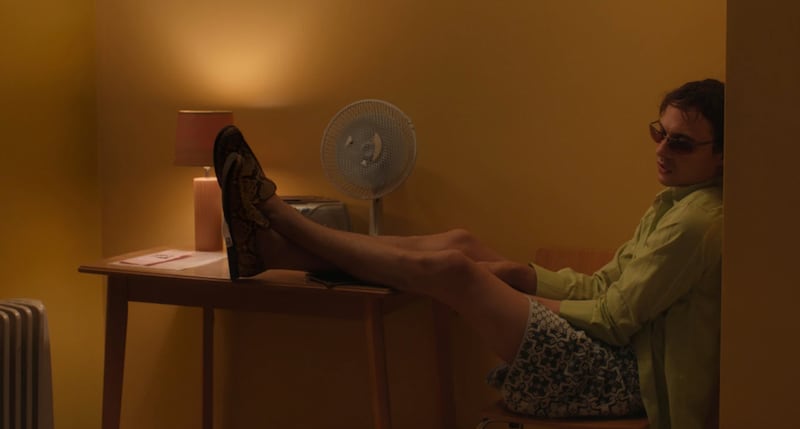CANNES, France—Over the past couple of years Harris Dickinson has emerged as one of his generation’s most promising young actors.
He might not be as famous as fellow heartthrobs Paul Mescal or Timothée Chalamet on the internet boyfriend scale, but talent-wise he’s just as impressive. He was a bratty male model in Triangle of Sadness and a tragic wrestler in The Iron Claw. In Babygirl, he seduced Nicole Kidman with an oddball dom energy and grooved his way into our hearts dancing to “Father Figure.” He’s remarkably hot, but also incredibly versatile.
Now it turns out on top of all of that he’s actually a remarkably talented director. He just premiered his first feature, Urchin, in the Un Certain Regard section at the Cannes Film Festival. It’s a remarkably assured directorial debut, about a young man on the margins in London.
Urchin has shades of the work of the Safdie brothers in its nervy energy, and owes something to British auteur Andrea Arnold in its sensitive portrayal of life on the fringes of society. But it’s also entirely Dickinson’s own vision, which meshes the surreal and the bracingly real.
At the center of the story, which was also written by Dickinson, is Mike, played by Frank Dillane in a stunning performance. (If Dillane looks familiar you might know him from Fear the Walking Dead or playing Tom Riddle in Harry Potter and the Half-Blood Prince. He’s also the son of Stephen Dillane of Game of Thrones).
We meet Mike sleeping on the streets and panhandling for change. Twitchy from unseen drug use, he gets in a public brawl with his friend Nathan (Dickinson, in a small role himself) that is broken up by a good samaritan, who offers to buy Mike a meal. Instead, Mike beats and robs him, stealing a watch which he immediately pawns.
He’s quickly apprehended and sent to jail. It’s there you begin to see Dickinson’s unusual approach start to take hold. While Mike washes himself the shadows, his body shuddering from withdrawal, Dickinson’s camera follows the water down the drain. It morphs into an almost unnervingly psychedelic depiction of amoeba-like organisms, before the end of the tunnel reveals a wooded quarry. A small figure stands at the bottom of it, overwhelmed by natural spectacle.
And then we return to the life of Mike as he is being released. Sober in both mind and body he seems eager to start anew, getting a job as a chef at a rundown hotel restaurant, and listening to meditation tapes in his bare hostel room. He even makes friends with some of his fellow employees, joining them for karaoke, where they sing “Whole Again” by 1990s British girl group Atomic Kitten.

Dillane does a brilliant job of making you feel just how tentative Mike is as he re-enters the world. He has a jitteriness about him that can read as occasionally sweet, but we know can turn volatile. In each of his movements you can feel him trying to hold onto his recovery. And as the plot moves forward you can see him starting to slip.
I don’t think it would be a spoiler to say that Mike’s journey is not a happy one, but Dickinson doesn’t make it dour either. What’s depicted on screen is not devoid of joy. A brief fling with a drifter (Megan Northam), who lives in a tricked out van, has an initial loveliness to it, until the spell is broken.
Still, there’s a hopelessness that hovers over Mike’s interactions. Dickinson doesn’t present him as a victim, and yet he has so little support it seems inevitable that he will backslide. And yet there is no moralizing here. The system isn’t in place for Mike to succeed, however Mike is also a man who has done reprehensible things that he is unable to confront. Shot by French cinematographer Josée Deshaies, the film seems suffused with the texture of the London outskirts that Mike occupies, a world where all these contradictions live.

There’s a way in which Urchin could be rote, falling into old tropes of addiction-fiction. Dickinson resists that. That’s in part thanks to the fantastical detours not unlike the shower moment, which recreate the feeling of being inside Mike’s body without being too obvious. Through them you feel the character’s claustrophobia, in his own skin, as well as the euphoria that a high can provide, and the terror that the past can unearth.
Dickinson leaves you on a note that once again defies convention, in a finale that’s as upsetting as it is dreamy. And while you ponder the tragedy of what you just witnessed, you are left stunned by how talented Dickinson and Dillane are. It’s the kind of work that makes you excited to see what they do next.

